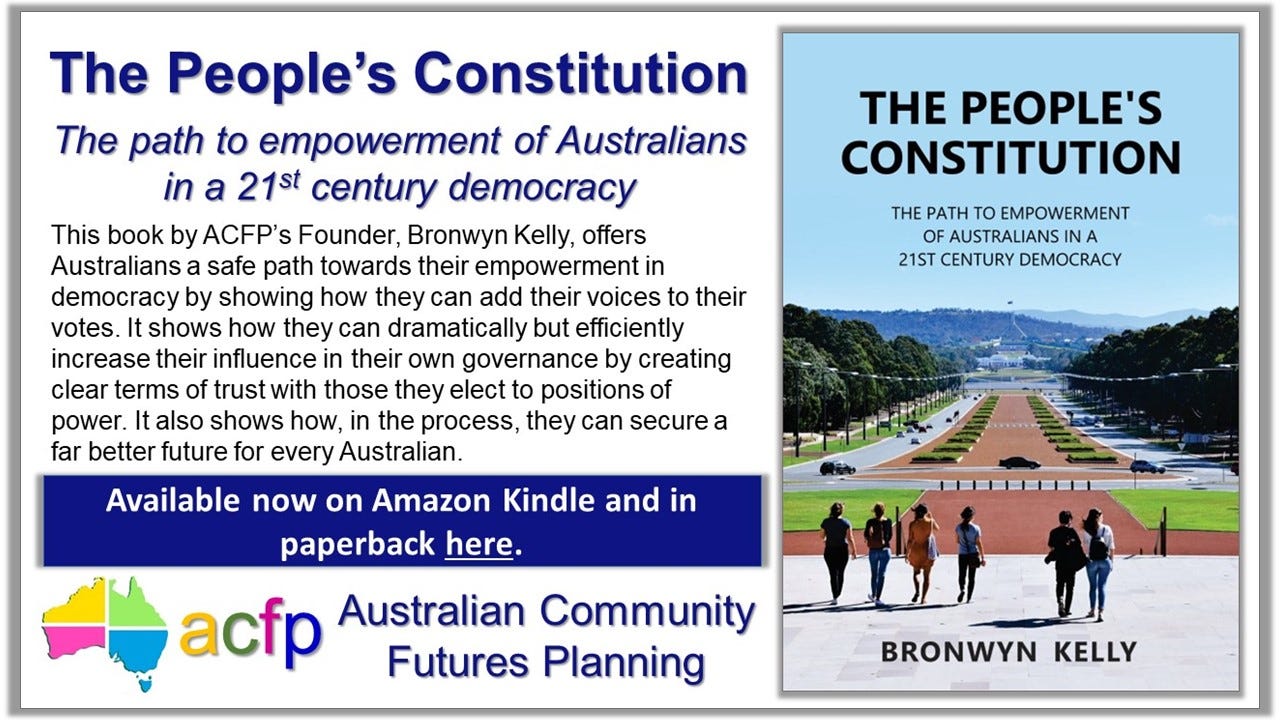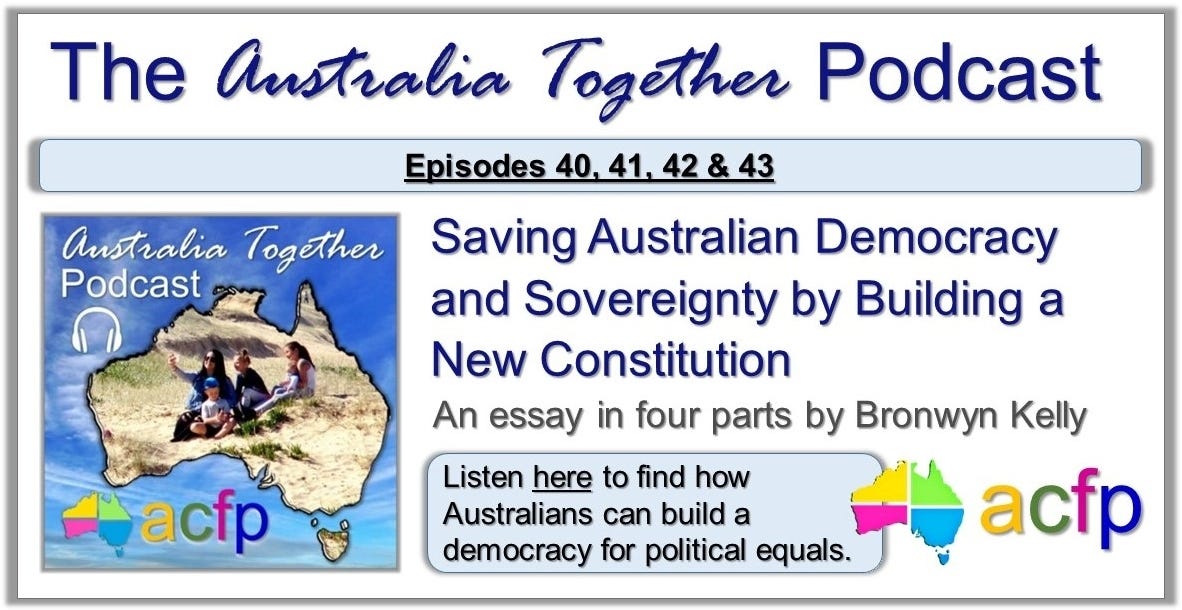Australians need to collaborate to build a new Constitution – Part 2
Australians need to build a democratic state in which the people are acknowledged as sovereign.
Under Australia’s Constitution, the people of Australia have no way of binding the parliaments and governments they elect to be loyal to them. This is because once parliaments and governments are elected the members must take an oath that obliges them to give their loyalty solely to a foreign monarch who has no reciprocal obligation to Australians or their interests. Based on the recent outcome of the prosecution of David McBride, it would appear that this oath actually binds those we elect to ignore or even act against the public interest if the King or his Executive so orders.
Unless an elected parliamentarian takes this oath, they cannot actually take up a seat in parliament. So while Australians might assume that only they can decide who shall govern them and that those they elect will act in their interests, the reality is that the constitutionally enshrined oath divests those we elect of any loyalty or obligation to the electors and their interests before they can be permitted to take up the seat we have offered them. This is an intolerable situation if the people of Australia want to live in a democracy, including one where we can be confident that elections will lead to the appointment of parliaments and governments that we can trust.
Procedurally, it might be thought that the remedy for the problem is to simply jettison the oath and replace it with an oath of loyalty to the people. But this is easier said than done and in any case will not solve the problem. To start with it is likely to require a referendum that we should expect would be strongly resisted by executive governments. After all, if it were to pass it would eliminate the sovereignty of the King in Australia but it might also (depending on what it is replaced with) eliminate that of the Executive (those few select ministers who advise the governor-general as the King’s representative and thereby wield absolute power – power with no limitations). Nor, in the absence of wider constitutional reform, could the people of Australia be confident that even if parliaments were newly obliged to be loyal to Australians rather than the King this would effectively constrain the Executive from acting contrary to the interests of the public. A new oath of loyalty to the people might eject the King from our polity, but it would not constrain executive governments from behaving as they are able to under the current Constitution – namely in a manner that can all too easily result in abuse of the rights and interests of Australians.
Moreover, we should be cautious enough to assume that this suboptimal result would apply in the event that Australia becomes a republic. For instance, it would apply if ties are cut with the British monarchy and elected parliamentarians are thereafter required to take a new oath in a form similar to that recommended by the Australian Republican Movement in January 2022, which was:
I will be loyal to the Commonwealth of Australia and the Australian people whose Constitution and laws I shall uphold.
On the face of it this suggested new oath makes sense in a nation seeking to establish a republic in a democratic form, because it would appear to transfer a parliamentarian’s loyalty to the people of Australia. But the problems with this are manifold. For instance, if nothing else about the Constitution changes then this new oath would do nothing to clarify the public interest, in which case those taking the oath would still be lawfully able to escape obligations to protect the public interest. In effect, an oath of the kind suggested by the ARM would merely divert loyalty back to a Constitution that leaves it open to an executive government to argue that as long as it is acting in accordance with that Constitution then by definition it is being loyal to the people and their interests. This too would appear to have some sort of internal logical consistency – until, that is, we recognise that the existing Constitution does not limit the power of either executive governments or parliaments to make laws that are contrary to the public interest. In short, anyone taking this new oath could profess loyalty to the people of Australia but then immediately escape it because the law would still allow them to disregard the public interest and, for that matter, the national interest. A Constitution that does not specify the public interest enables governments to disregard it.
What this means is that if Australia becomes a republic and this new suggested oath is the only change made to the Constitution itself, then all we are doing is taking the crown off the head of the King and putting it on the head of an executive government that still has no specified obligations to Australians and will have exactly the same absolute power as the Constitution currently allows. The Executive will retain that absolute power as long as the public interest remains unspecified in the Constitution.
This does not mean Australia should shy away from becoming a republic. If anything, what the McBride result indicates is that our current constitutional monarchy and a true democracy are mutually exclusive. We can’t (and don’t) have both. So if as a nation we want to become a democracy and be comfortable that our democratic processes and rights are properly protected by the Constitution, then we must shuffle off both the monarchical form of government we have now and anything else in the Constitution that prevents the people from controlling the excesses of an Executive inclined to abuse its rightful power.
By extension this means that Australians must begin working out the terms of a new Constitution which specifies the essential elements of the public interest and assigns different types of power to those who should rightly hold each type in a democracy so that our interests are safely secured. This will involve giving some measure of power to a party in our polity that currently has none under the Constitution – the people of Australia. At the very least the people should be accorded enough of the right type of power to ensure that we can establish a stable democracy where citizens have political equality. In other words we need to build a new Constitution in which the people (not parliaments or executive governments) are accorded sovereignty and can demand the making of laws that will rightly control potential abuses of power by executive governments or parliaments. In positive terms, they should be able to demand the making of laws that protect and promote the public interest.
As a minimum this will involve Australians in learning how to build terms of trust that they can offer to those seeking election. These terms of trust will need to specify the rights and interests of Australians so that when they hand over power to those they elect everyone is clear about what power may be rightly used for, and what it may not – what is in the public and national interest and what is not. Fortunately, it need not be difficult for Australians to learn how to do this and it is imperative that they begin to do it by collaboration because laws made by various governments during the 21st century now constitute an existential threat. They are enabling executive governments to disregard our interests on vital matters of war, climate change, nuclear energy and weapons, chemical and biological threats, and access to unpolluted air, food and water.
As things stand in the arrangements of the Australian state, it is apparent that executive governments are not trusted by Australians. Alongside a fatally flawed Constitution, that lack of trust is a root cause of the failure of our democracy and it is the first thing we must fix before we can expect any of the other threats to our existence to be eliminated. Readers can find out more about the form these terms of trust can take and how we can begin developing them by collaboration in Episode 43 of the Australia Together podcast where I read Part 4 of an essay on Saving Australian Democracy and Sovereignty by Building a New Constitution. A full transcript of all four parts of this essay is accessible at https://www.austcfp.com.au/major-essays
This post was first published in John Menadue’s Pearls and Irritations.
More information about why Australia needs to build a truly democratic state where the people are acknowledged as sovereign can be found in my latest book, The People’s Constitution: the path to empowerment of Australians in a 21st century democracy, available in paperback here and on Kindle here. Or click on the picture below. Or visit the Australian Community Futures Planning website to purchase The People’s Constitution at https://www.austcfp.com.au/publications
Or listen to the audio version of The People’s Constitution on Apple podcast here.
Listen to the new essay on how Australians can save their democracy
Click on the image below to listen to a new major essay of Saving Australia’s Democracy and Sovereignty by Building a New Constitution. Or view the full transcript of the essay here.
Find out all about ACFP
Become involved in building plans for a better Australia here.








I always agree with your analysis of our predicament but I have no expectation of change. It's a bit like listening to the leading climate scientists post their data and warn of the worsening prospects and knowing nothing will be done except where profit sees a path to new returns. Thanks for keeping going.
Thanks Bronwyn, for your further explanations around our crisis of self-determination. Enthusiastic participants in the existing 'top-down' arrangements seem so beguiled by power that the apparatus becomes ever more vulnerable to capture by other forms of power, often mendacious forms designed to repudiate the will and reason of the people. Interesting to think about the devolution of executive power wherein the aspirant to power always looks upward (and at least feigns deference) rather than availing themselves of the potency of the masses on whom they look down, while potentially exploiting the good faith invested by citizenry. Something I fail to understand is whether participants in the current arrangements have any idea as to the illegitimacy of the narrative which pretends to offer democracy and self-determination; and if so, how can they keep showing up and going through the elaborate motions of what appears to be a game of deception.